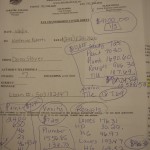It’s the “white picket fence” of the American Dream —homeownership, yet many who have achieved this goal face the unmentioned reality: home ownership has its drawbacks, its incumbent responsibilities, and as Dana Stover, my interview subject, colleague, and friend said, not many of us pay attention to the particulars, in this case insurance coverage, and the relationship between the mortgage-holder and homeowner, until they are forced to–”until something happens, and then it’s too late.”
After a lengthy process, Dana purchased her condominium in December of 2011. Dwellings are seldom purchased outright, and banks that hold the mortgage require coverage to protect their risk. The costs of ownership slapped her in the face each month, in condo fees, and a mortgage payment. Originally Dana found herself debating the move to purchase, eventually deciding in its favor. Who doesn’t want to live independently as a twenty-something with a secure job?
In January of 2013, Dana awakened to a cold house, “something must have happened…the heat tripped or something,” but she went to work and came home, and “everything was fine.” The heat was working. She was supposed to have been in Key West, taking a mini-vacation, but had decided against it, and on this frigid January morning, she was wishing she had gone. It would turn out that her decision to remain in Toms River was a blessing.
“That evening I left my house about 7:30, and I came home two hours later. I walked in from my garage into the house. Water was pouring out of my ceiling from my half-bath, the hallway and dripping into my living room. I went down to the basement, ‘cuz that’s where my water turn-off is, and the water was seeping through the floor into the basement, so everything in the basement was soaked.” Water oozed from light fixtures. Dana could only imagine how badly this could have gone, had she been away for a week, water pouring into her house unchecked. “This was one of my take-aways. I will always turn off my water when I go on a trip—no matter how long it is.”
“The next day I called right away, the insurance company. I made a claim. I did not call my condo association. I didn’t realize at that point that they carry me also under their insurance.” The insurance company said they’d send an adjuster right away and Dana took photos of the original damage and called a plumber to get started on the repairs. A pipe had burst and “you have no idea how much water can flood out in such a short time.”
The insurance company, true to its word, sent a crew that began clean-up and demo, and submitted a necessary proposal. “There was $60, 000 worth of damage…but the guys pumped me up. ‘And you’re gonna get your house redone; it’s gonna be great.Their job is to make you whole.’ I hired them. They started the process ripping things up.” This went on for several weeks, and “I was so excited, on my road to recovery.”
At this point the head of the crew told Dana that she was not going to get the $60,000, but only half, as she did not have enough coverage. Too late, Dana began looking into the particulars of her coverage, what she was actually entitled to receive, and she admits, ”My coverage should have been assessed before anything began.” Dana learned that the term “dwelling” insurance means the amount required to restore a house to its before-the fire-condition were it to burn to the ground. Dana learned that her dwelling, the structure was only insured for $27,000, not nearly enough to restore her condo to pre-incident condition. That didn’t even include the contents, another facet of the insurance coverage. Dana regrets now that she didn’t up her coverage, which she has since done, but rightfully claims that no one at the insurance company clearly explained what “dwelling coverage” required. “If they had told me about the house burning to the ground, I would have upped it.”
Dana did get money from the condominiums’ master policy thanks to the pictures and documents she kept, attesting to both the damage and the repair work she had done. “Always have your paperwork. I keep a file. In my file I keep all receipts, all records,and notes about everyone I talk to. I’ve had to use it so often to verify that what I’ve done, as proof.”
“ I feel so badly for Sandy victims, people who have true damage to their home, yes my home was damaged, but I’m at my wits end with a home that’s livable. I can’t imagine someone who’s truly homeless, or without a family to support them, or a place to go.” Dana’s mom, who has been involved in helping Sandy victims, first as a counselor, and now as an intake worker for those who need assistance, has told Dana nightmare stories, so Dana knows that her “waiting on my money” hardly compares. “Some of these people are old with nothing and no one—waiting on their money.”
The insurance company sent her a check, but “when I received the check, the $27,000, I thought, ‘It isn’t enough, but I’ll take it.” The check was not made out to Dana alone, however, but to Dana and the bank holding her mortgage. For Dana, this is where the real nightmare began. Currently, the bank refuses to release the funds. Because her check is over the threshold amount of $7,000, Dana’s check will be released in increments. As Dana explains, her difficulties with the bank, and their concern for fraud, stems from what happened in the wake of Hurricane Katrina, according to what her insurance adjuster has explained.
During that upheaval, many people received their insurance money without the bank’s involvement, and rather than rebuild, the residents relocated, probably in many cases, because the funds were insufficient to restore the dwelling. “This is the true problem. The bank is holding the insurance money, and I don’t know if it’s true for every bank, but I’ll bet it is. That means, think of all the money being held–and making interest for them [the banks]—for Sandy victims’ whose checks are surely much larger than mine.”
This is where she is now, frustrated and waiting, for what other recourse does she have? Hiring a lawyer to oppose the bank will only add to the cost of this debacle. Despite all the document-sending and re-sending and tedious, lengthy phone calls, being passed from one bank employee to another, Dana still waits on her money. I guess she shouldn’t be surprised, for after all, the bank truly owns her home, as do banks throughout this country. It makes one question the glory of ownership and the false security of insurance.
As Dana concludes, “I’m not going to Hawaii with this money. I just want to make myself whole.” She is, as her story reminds us, not alone.
Works Cited
Stover, Dana. Personal Interview. 11 November 2014.


